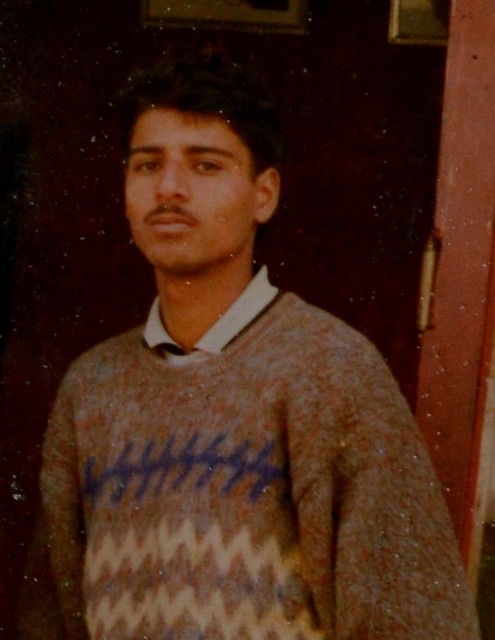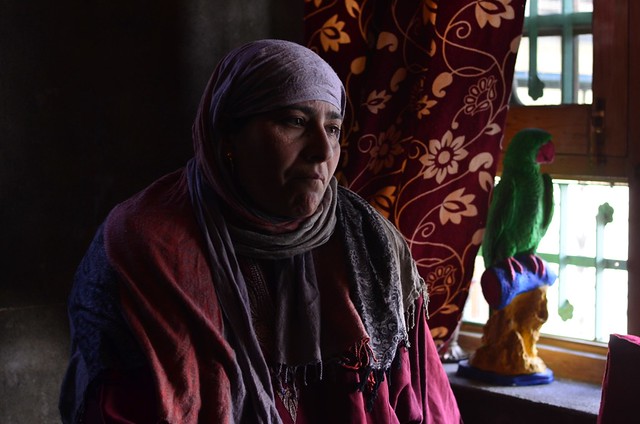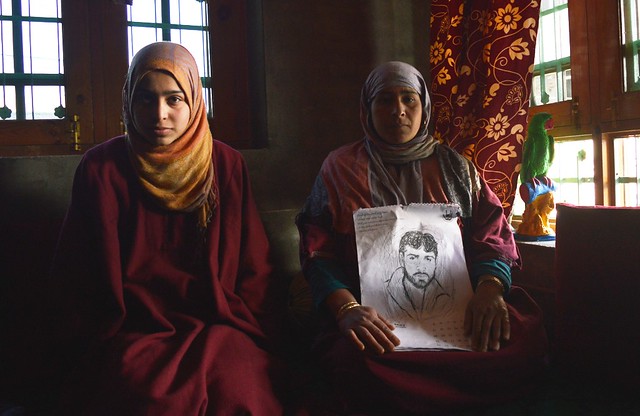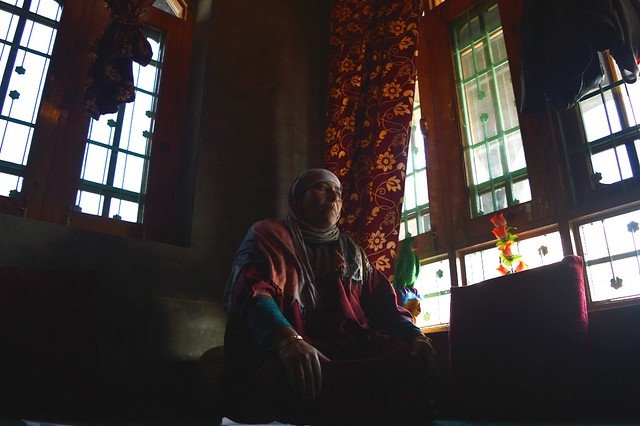In the third of the five personal stories of half widows, Raqib Hameed Naik narrates the story of Rafiqa Mushtaq.
Tengpora (Srinagar): On the late evening of Sunday, April 13 1997, Rafiqa Mushtaq, then 23, was feeling exhausted after spending the day cleaning her house in Tengpora locality of Srinagar for Eid-Al-Adha which was due to be celebrated after four days. After serving an early dinner, she put her infant son to sleep while two other sons had already slept beside their father, Mushtaq Ahmed Khan.

Mushtaq Ahmed Khan, 25 was working as a daily wage employee in Jammu and Kashmir forest department. Even as insurgency and subsequent government forces crackdowns in valley rose to its peak in 1990s, he was quite optimistic that it won’t affect the people leading normal lives. Destiny, however, had planned something far more sinister.
At around 10 PM, when all the family members had gone to sleep, army men from 20th Grenadiers Rashtriya Rifle under the command of its officer, Nazar Mohammad arrived in Tengpora and drove straight towards his house. The moment they entered the house, the whole neighborhood woke up to the cries of Khans.
“The army men thrashed the entire family. They didn’t even spare the women and my four-year-old son. After taking my husband to a separate room, they locked me and my kids in one room and my in-laws in other room,” recalls Rafiqa.
The army men took his husband to another room where the brutal torture began, with neighboring alleys reverberating with his cries.
“To stop him from crying out loud, they stuffed dining spread into his mouth and then poured water on it,” says Rafiqa.
After two hours of interrogation, the army men took Mushtaq to the neighboring house of his close friend Mushtaq Ahmed Dar, 19. Both had the same first names, and both faced the same questions: “Samaan Kahan hai (Where is the ammunition?),” to which they replied negatively thus irking the soldiers leading to continuous excruciating physical torture.
The interrogation continued unabated till early morning until the call for morning prayers (Azaan), following which they were taken to their camp in Boatmen Colony in Bemina, Srinagar.
“We were locked in the rooms. when soldiers left, our neighbors’ came to unlock us but unfortunately my husband was taken by them,” says Rafiqa as her face turns pale.
After a sleepless night, she along with her parents and in-laws went early morning to meet the army officer Nazar Mohammad in their camp in Boatmen Colony, “When we went there, he acknowledged picking him up and he said that he will release him soon.”
As days turned into weeks, her husband didn’t return, prompting her to once again knock the gates of army camp but to her utter shock, the concerned army officer was transferred whereas the new officer, in a repeat of what we saw in Part One and Part Two , the officers denied the presence of her husband in custody. The day marked the beginning of intense search for him across the torture centers, camps and police stations across Kashmir.

“I am not able to understand what they did to my husband. Is human life so cheap in this part of the globe?” asks Rafiqa.
After months of intense search refused to yield any result, she decided to knock the doors of judiciary. Nineteen years later, her husband’s involuntary and enforced disappearance the case in court stays in limbo.
She was left with three sons and a daughter, who was born a few months after her father’s disappearance. “We were/are poor people and the little salary which my husband used to earn was the only source of income for us which sustained us. But after he went missing, we were left at the mercy of God as my father-in-law was a poor farmer who could barely sustain us,” she said.
A decade after her husband’s disappearance, Rafiqa was paid an ex-gratia amount of Rs 1 lakh and a promise of the lowest rank of non—gazetted job for her son under the Statutory Regulatory Order (SRO) 43 notified by J&K government in 1994. However, these turned out to be fake promises. These cases are screened by district screening-cum-coordination committees (DSCCC) constituted at district level by the government. The amount has to be refunded back if the victim turns out to be alive. “Rs 1 lakh was a big prank played on us. The government divides amount into many parts. One part is paid to the parents of victims, some part is kept fixed in bank account for children and the remaining is left for the wife. They did not even provide a job to my son,” Rafiqa says.
The struggle after disappearance
With almost zero money and three children to feed, Rafiqa sought help of her father who was a farmer in Batamaloo. He single-handedly took care of their expenses all through these years, besides taking whole responsibility of financing the education of her children. “I am indebted to my father who helped me when I was in dire need.”
Her in-laws tried to undermine the property rights of her children as they asked her to leave the house after Mushtaq went missing. However, Rafiqa was adamant that her receive their right over the property and put a brave face and continuously struggled for 14 years. “The future of my children was our (Rafiqa and Mushtaq’s) first preference and we both used to talk about it when he was with us. After he went missing, my in-laws tried to snatch away the rights of my children over the property, but I fought because I didn’t want my children to suffer like me,” says Rafiqa.

“It was usual for them to ask me and my children to vacate their place over minor issues,” she adds.
In 2014, Rafiqa asked the Mohallah Panchayat to intervene in the matter, after which the Panchayat directed the in-laws to pay the decided amount so that she could construct a new house. The amount was later given to her and presently, the construction of a new house, though slow, is in progress. “I didn’t relent and I was adamant in my stand which finally led them to admit our rights.”
Two of her sons, Amir Khan, 23 and Sameer, 21, dropped out after finishing their Class 12 exams to help construct their new house, so as to save labour costs. They expect to get jobs soon so as to better the financial condition of their family. Meanwhile, Rafiqa’s younger son Faisal and daughter Farzana are still studying in 10thstandard and are hopeful of getting admission in some professional college in Kashmir after finishing their senior secondary.
“I grew up without the shadow of my father. This reality pinches me whenever I think about it, but fortunately time is a good healer so things are getting better than before. But the question always resonates in my mind: what did they do to my father?” asks Rafiqa’s daughter Farzana.
“I want him to come back and I am hopeful he will come back,” she adds.
For Rafiqa, the Association of Parents of Disappeared Persons (APDP) co-founder Parveen Ahangar, whom she lovingly calls ‘Jiji’ is everything. “Jiji is more than my mother, my sister. She is my friend with whom I share my pain. Whenever I am in dire need of anything, she comes to my rescue. She is like a messenger for me,”
Like other ‘half widows’, every month on the 10th, Rafiqa travels 10 kms from her home in Mahrajapur, Batamaloo to Pratap Park near Lal Chowk to take part in the silent sit in with relatives of the other missing persons.

“I have never missed a month when I haven’t visited the park. It is a place where I came across cases similar to me. We all share and grieve our pains together which somehow reduces the pain of longing from our hearts.”
Rafiqa, her three sons and a daughter are still affirmative that one day Mushtaq will return back to home in good health but they are aware of the reality that he might never come, “We have left everything on God, all we can do now is hope,” Farzana adds.
Read Part-I here: Armed with a pictures that tell a thousand words: The protestors of Pratap Park
Read Part-II here: The half widows of Kashmir: A story of endless wait and hardships
Watch Short Film here: Half Widows of Kashmir
Read Part-III here: Married at 17, ‘Half widowed’ at 18: Safiya Azad continues to wait even after 23 years
Read Part-III (2) here: 19 years and counting: the tale of Naseema Begum’s wait for her missing husband

